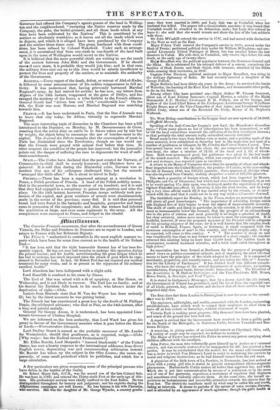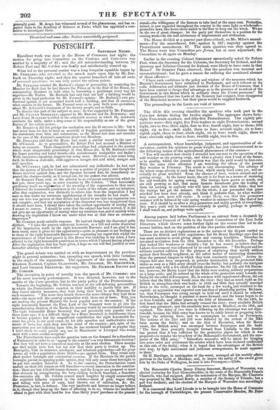Ofstellantous.
The Courrier Francais announces, that after the accouchement of Queen Victoria, the Duke and Dutehess de Nemours are to repair to London, and return to France with her Britannic Majesty.
The Times is "authorized to contradict in the most explicit manner re- ports which have been for some time current as to the health of Sir Robert Peel-
" It has been said that the right honourable Baronet has of late been fre- quently cupped. He has not once had occasion to undergo this operation during the present session; and his health, notwithstanding the great fatigue which he has had to undergo, has much improved since the attack of gout which he expe- rienced in November last. In fact, Sir Robert Peel has not required any medical treatment for many weeks, and is at present in the enjoyment of his ordinary excellent health."
Lord Aberdeen has been indisposed with a slight cold.
Lord Rancliffe is confined to his room by illness.
The Earl of Mar was seized with a fit of apoplexy, at Mar House on Wednesday, and is not likely to recover. The Earl has no family, and at his demise the Earldom falls back to his uncle, who labours under the deprivation of sight.—Globe.
Letters from Brussels state that M. Van der Weyer has been seriously ill; but by the latest accounts he was getting better.
The French bar has experienced a great loss by the death of M. Philippe Dupin, the celebrated advocate; who died at Pisa, on the 14th instant, after a long and painful malady. General Sir George Anson, it is understood, has been appointed Lieu- tenant-Governor of Chelsea Hospital.
We are informed on the best authority, that Lord Ward has given his proxy in favour of the Government measure when it goes before the House of Lords.—Worcestershire Chronicle.
Lord Dudley Stuart is named as the probable successor of Mr. Leader for Westminster, should that gentleman, as is expected, resign.—Globe. EWhy resign: has the Radical turned Protectionistn Mr. Elihu Burritt, Lord Morpeth's "learned blacksmith" of the United States, has sent a hearty response to the international addresses from divers English towns, deprecating war and recommending arbitration instead. Mr. Burritt has taken up the subject in the Olive Leaves; the name ap- parently, of some small periodical which he publishes, and which 1;as a large circulation.
A few particulars are given respecting some of the principal persons who have fallen in the battles of the Sutlej.
Sir Robert Henry Sale, G.C.B., was the second son of the late Colonel Sale. Be was born in 1782; and entered the Thirty-sixth Foot at the early age of thir- teen. His professional services were chiefly confined to the East Indies. He was distinguished throughout for bravery and judgment; and his exploits during the Affghanistan campaigns are well known. No less famous is his wife Florentia, who survives. She was the daughter of Mr. George Wynche, a country gentle-
man: they were married in 1809; and Lady Sale was at Umballah when her husband was killed. The rapers tell a characteristic anecdote: it was feared that unballah would be attacked in its defenceless state; but Lady Sale refused te leave it: she said that she would remain and share the fate of the last soldier's wife there.
Sir John BrCaskill entered the service in 1797, and had served with distinction in the West as well as the East.
Major D'Arcy Todd entered the Company's service in 1823: served under the Shah of Persia; performed political duty under Sir William DPNaghten; and One- ceeded Lieutenant Eldred Pottinger at Herat, but was recalled before the last disasters in Cabal. His wife died, at Umballab, only twelve days before his own death, at the early age of twenty-three. Maim Broadfoot was the political negotiator between the Governor-General and the Sikhs. He is celebrated for his intrepid defence of a convoy, comprising the families of Shah Zeman and Shah Suja13, with treasure, attacked by the Sikhs while crossing their territories, in 1841. Captain Peter Nicolson, political assistant to Major Broadfoot, was rising in the military diplomacy of India. He had recently married a daughter of Sir George Pollock. Major Baldwin had been thirty-six years in the Army: he survived the battle of Waterloo, the burning of the Kent East Indiaman, and innumerable other perils, to die on the Satlej. Among others who have perished are--Major Arthur W. Fitzroy Somerset, eldest son of Lord Fitzroy Somerset; Captain Herries, a relative of the Right Honourable J. C. Herries; Lieutenant IL H. Pollock, son of Sir George, and nephew of the Lord Chief Baron of the Exchequer; Lieutenant George Wyndham Knight Bruce, son of the Vice-Chancellor of that name; and Lieutenant George Alfred Croly, eldest son of the Reverend Dr. Croly, Rector of St. Stephens Walbrook.
The West Riding contributions to the League fund are now upwards of 38,0001. --Sheffield Mercury.
Speaking of the Anti-Corn-law League's new fund, the Manchester Ctusrdian says— From many places no list of subscriptions has been transmitted, or will be till the local committees transmit the collection of the first instalment thereon;_ so that probably the total amount really subscribed exceeds 180.0001." Bread made in two ways from Indian corn or maize, and a pudding made of the Same material, were submittted on Saturday last to the inspection and taste of a number of gentlemen at Glasgow, by Mr. Cowdin, the United States Consul. Two four-pound loaves were cut up into slices, the one composed entirely of Indian corn meal, the other a mixture of 24 lib. of the meal and * lib, of wheat-
flour. Both were pronounced good, but ireference was given to the loaf made of the mixed material. The pudding, which was composed of meal, with a little suet and molasses' was reported upon as excellent.
A return to the House of Commons shoes that the quantity of wheat and wheat- flour imported into the United Kingdom, the produce of Canada, in the year ending the 5th of January 1846, was 229,241 quarters: three quarters of foreign whea was also imported from Canada; making altogether a total of 229,244 quarters.
This week a quantity of foreign wheat, which had been imported by Messrs. Phillpotts and Co. of Gloucester, but which had since become damaged, so as not to be worth paying 178. duty upon, was destroyed, under the supervision of a very vigilant Customhouse-officer, by throwing it into the river Severn, and by keep- ing a very close official watch till it was carried away by the stream, or so inter mixed with the mud that it could not be in any way used.—Gloucester JournaE The Smithfield report for Monday, in the Times, makes an announcement that will alarm all good housekeepers. " The importance of admitting foreign cattle into England free of duty begins to wear the aspect of unquestionable necessity. The stock of cattle and sheep in particular, in the country, is at this present mo- ment so immeasurably below the demand, that the prospect of an extraordinary rise in the price of mutton and meat generally is no longer a question of doubt, but clear certainty, unless some means be taken to meet the consumption. It is doubtful, however, if even the proposed measure of the l'remier will beadequate for the pressing exigency of the case; for it is well known that the surplus stock of cattle in Holland, France, Spain, or Germany, is email compared with the enormous consumption of meat in this country, and which surplus only, it may be expected, will come to this .muntry. * • • The number of sheep on sale was considerably less than on any former occasion of a short supply; the number returned this morning being no more than 15,000 head. The mutton trade in consequent* received increased stimulus, and a brisk trade ruled throughout at high prices."
An association has been formed at Bordeaux for the purpose of propagating sound views on politico-economical subjects, and of employing the most effectual means to have the principles of free trade adopted in trance. It is composed of merchants, proprietors, and manufacturers, and has taken the title of "Associa- tion for the Liberty of Exchanges." It has divided itself into different commit- tees, who have the charge of the several departments of agriculture, navigation, manufactures, European trade, foreign trade, home.trade, 8:c. The President of the Association is M. Duffonr Dubergier; and the Vice-Presidents MM. Bruno, Devez Durin, A. Duvergie, and Paul Vignes.
It is stated in Galignauis Messenger, that by a decree dated the 5th instant, the Government of Puland has prohibited, until the 1st of July, the export:of corn of all kinds, potatoes, hay, and straw, and declared that all those articles may be imported duty-free.
The first-class fare from London to Birmingham is now the same as the second- olass was in 1844.
The engineers, millwrights, and smiths, connected with the London engineering establishments, have struck work to compel their employers to allow them to leave off at four o'clock on Saturdays, without abatement of wages.
Victoria Park is making great progress; fifty thousand trees have been planted, and much of the ground has been laid out.
A report is revived that the Govermnent have resolved to form a public park for the South of the Metropolis, in Battersea Fields, between Vauxhall and Bat- tersea Bridges. A musician, in giving notice of an intended concert at Cleveland, Ohio, said, "A variety of songs may be expected, too tedious to mention."
The Mayor of Exeter has ordered the Police to arrest any person carrying about children afflicted with the smallpox.
John Potter, the man who voluntarily gave himself up to justice as e 7eturned convict, and was recently sentenced to be transported for life, has received a free pardon. It may be remembered that the motive for the man's self-denunciation was a desire to revisit Van Diemen's Land to assist in reclaiming the convicts by moral and religious instruction; as he had himself turned from his evil ways.
A physician of the little town of La Perriere, in Normandy, has just arrived at Paris with a young girl who is stated to present extraordinary electro-magnetic phrenomena. Mademoiselle Cottin makes all bodies that approach her, and with which she is put into communication by means of a conductor, or by the mere end of one of her garments, experience a movement of repulsion that displaces and sometimes even violently subverts them. At the same time, she herself ex- periences an instantaneous and irresistible attraction towards the objects that fly. from her. The electricity manifests itself by what may be called fits and starts, fading at intervals. It seems to partake of the nature of some nervous diseases, and is attended by an appearance of much agitation; though the girl's health is
generally good. M. Arago has witnessed several of the phenomena, and has re- em to the Academy of Sciences at Paris; which has appointed a com- mittee to investigate them.



























 Previous page
Previous page